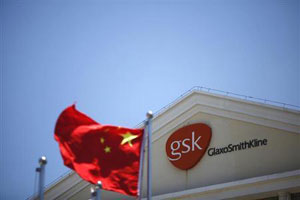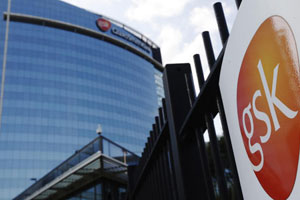CHANGSHA - The bribery investigation of GlaxoSmithKline (GSK) China is complete and the case has been handed over to prosecutors, Changsha police said on Wednesday.
Prosecutors have started their examination of the case that involves a total of 46 suspects, with Mark Reilly, a British national and manager of GSK China, among them. After ten months of investigation, police found that Reilly had ordered his subordinates to offer bribes.
Reilly allegedly pressed his sales teams to bribe hospitals, doctors, other medical institutions and organizations through various means and gained illegal revenue worth billions.
Reilly became head of prescription drugs at GSK China in Jan. 2009 and was promoted to general manager of GSK China in Nov. 2012. Two other executives, Zhang Guowei and Zhao Hongyan, are also suspected of bribing officials in Beijing and Shanghai to escape investigation.
Bigger bribes bring better sales
To boost sales and squeeze out rival companies, GSK China allegedly bribed doctors to prescribe their drugs. Li, one of the suspects in the case and doctor at a Hunan hospital, told Xinhua that in March 2012, a GSK sale representative offered him 20 yuan (3 US dollars) for every box of Heptodin he prescribed and 100 yuan for every new patient who started using the drug. Heptodin is used to treat Hepatitis B.
Li normally prescribed 150 to 200 boxes of Heptodin and recruited five to eight new patients each month, which brought him about 4,800 yuan of extra income. Tan would register the expense as payment for Li lecturing in the company's training programs.
"I paid him every month but in fact he just gave lectures once or twice," said Tan.
Another way to bribe doctors is to cover the expenses of attending medical seminars.
Zhang Guowei, a key suspect who was vice president and human resources director of GSK China, told Xinhua that the focus on sales growth led to the bribery.
"The global headquarters imposed high sales growth targets. When Reilly took over the post, the company's strategy shifted from profit-oriented to sales-oriented. The sales target in China was raised every year to compensate the reduction in U.S. and European markets," Zhang said.
According to Guo Jianhua, a human resources manager also involved in the case, the company's sales force increased from about 1,000 in 2008 to 5,500 today.
Police found that the company forced its sales team to bribe to achieve their soaring sales targets.
Liang Hong who was the company's vice president and operations manager, confirmed that those who met sales targets received big bonuses, promotions and overseas vacations while those who failed were demoted or fired.
In a statement to police, Liang said every representative was allowed to spend 3,000 to 5,000 yuan on kickbacks to doctors. "If this was not enough, they could apply for more. For hepatitis medicines, the kickback can account for five to eight percent of the drug's price," he said, but for other drugs might be as much as 30 percent and total hundreds of million yuan.
GSK China's revenue in China increased from about 3.9 billion yuan in 2009 to 6.9 billion yuan in 2012.
According to police, Reilly and his colleagues disguised illegal revenue in the Chinese market by forging transactions between GSK China and several foreign arms of GSK, making the revenue look like funds used to purchase raw materials in China. They made every effort to cover up the illegal practice during regular checks by regulatory authorities. In terms of sales of prescription drugs and vaccines, police found that all pharmaceutical factories and departments of GSK China nationwide had been involved in commercial bribery.
Last July, police detained four senior executives of GSK China on suspicion of commercial bribery. Reilly was not among them.
 |
 |
